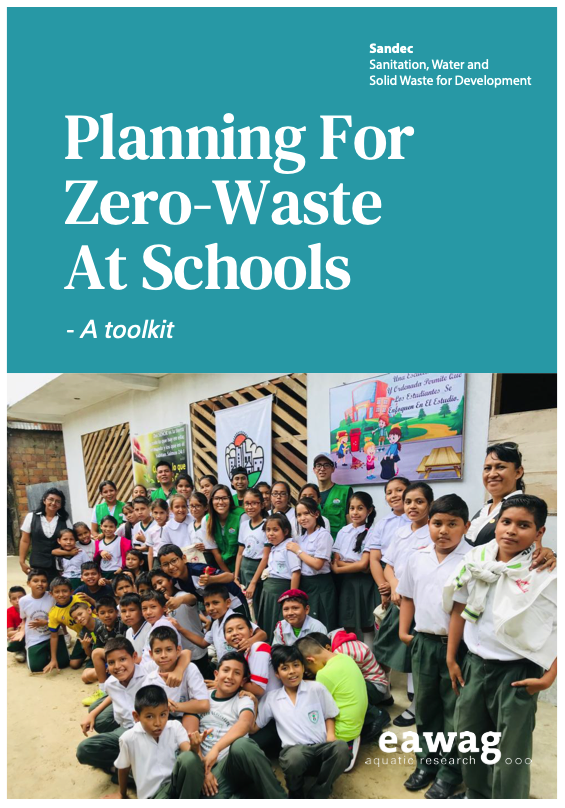toolkit
Planning for Zero-Waste at Schools - A Toolkit
Author: Mertenat A., Zurbrügg C.
Year: 2023
Publisher: Eawag Sandec
This toolkit aims at providing step-by-step guidance accompanied by tools to develop and implement “Action Plans” to close the loops of material and resources at any school level, considering a system approach and focusing on low-tech options that could be applied in any low- and middle-income settings. It aims at developing innovative solutions, which maximize on the synergies between waste management, water, sanitation, food production, health, environment, and energy generation in schools.
The Zero-Waste at schools toolkit targets learning, application, and practice so that students become agents of change and ambassadors for sustainable behaviour and a cleaner world under a circular economy.
Target audience:
This toolkit is for individuals or organizations, such as:
- School community members (teachers, students, non-teaching staff, etc.) who want to improve solid waste management in their own institution;
- Non-Governmental Organizations (NGOs) and civil society organization who want to support educational institutions in implementing a Zero-Waste approach
Rating
Would you like to see other resources here?
Give us your feedback"*" indicates required fields
Related Resources and Tools
An approach to transforming pit latrines into on-site faecal sludge treatment facilities
Video from the presentation at the Emergency Environmental Health Forum (EEHF) 2025 by Bara Wahbeh…
Water and Conflict: A Toolkit for Programming
This practical toolkit explains the connection between water management and key risk factors associated with…
Technical Brief: Climate Resilient Sanitation in Practice
Climate change is drastically changing the world we live in. It devastates lives, causes changes…
Gender In Emergencies Standards
Oxfam’s 2022 Gender in Emergencies (GiE) Standards are the key internal tool by which we…
Monthly OPEX Anaerobic Baffled Reactor
Humanitarian Aid Solid Waste Assessment and Improvement (HAWAI) Guidelines
The Humanitarian Aid Solid Waste Assessment and Improvement (HAWAI) Guidelines are designed to support effective Solid…
WASH for Peace Guidance and Tools
Integrating conflict sensitivity and peacebuilding approaches to WASH programming in fragile and conflict-affected contexts Despite…
Monthly OPEX, Lime Stabilisation Pond
The IASC Gender With Age Marker
The IASC Gender with Age Marker (GAM) helps users to design and implement inclusive programs…
WASH Safety and Accessibility Toolkit
This toolkit is designed to provide practical monitoring mechanisms to track the quality and safety…
Oxfam Gender In Emergencies Standards
Oxfam’s 2022 Gender in Emergencies (GiE) Standards are the key internal tool by which we…
Biogas Technology Evaluation Tool
An Excel-based calculation tool that can be used in conjunction with the guide “Is biogas…
Violence, Gender and Wash: A Practitioner’s Toolkit – Making Water, Sanitation and Hygiene Safer Through Improved Programming and Services’
This toolkit has been developed in response to an acknowledgement that although the lack of…
Wash Safety and Accessibility Toolkit
This safety and accessibility rapid audit tool is based on visual observation as a means…
Gender Equality and Social Inclusion Self-Assessment Tool
This guidance is for staff of water, sanitation and hygiene (WASH) implementation and research projectsand…
An approach to transforming pit latrines into on-site faecal sludge treatment facilities
Video from the presentation at the Emergency Environmental Health Forum (EEHF) 2025 by Bara Wahbeh…
Water and Conflict: A Toolkit for Programming
This practical toolkit explains the connection between water management and key risk factors associated with…
Technical Brief: Climate Resilient Sanitation in Practice
Climate change is drastically changing the world we live in. It devastates lives, causes changes…
Gender In Emergencies Standards
Oxfam’s 2022 Gender in Emergencies (GiE) Standards are the key internal tool by which we…
Monthly OPEX Anaerobic Baffled Reactor
Humanitarian Aid Solid Waste Assessment and Improvement (HAWAI) Guidelines
The Humanitarian Aid Solid Waste Assessment and Improvement (HAWAI) Guidelines are designed to support effective Solid…
WASH for Peace Guidance and Tools
Integrating conflict sensitivity and peacebuilding approaches to WASH programming in fragile and conflict-affected contexts Despite…
Monthly OPEX, Lime Stabilisation Pond
The IASC Gender With Age Marker
The IASC Gender with Age Marker (GAM) helps users to design and implement inclusive programs…
WASH Safety and Accessibility Toolkit
This toolkit is designed to provide practical monitoring mechanisms to track the quality and safety…
Oxfam Gender In Emergencies Standards
Oxfam’s 2022 Gender in Emergencies (GiE) Standards are the key internal tool by which we…
Biogas Technology Evaluation Tool
An Excel-based calculation tool that can be used in conjunction with the guide “Is biogas…
Violence, Gender and Wash: A Practitioner’s Toolkit – Making Water, Sanitation and Hygiene Safer Through Improved Programming and Services’
This toolkit has been developed in response to an acknowledgement that although the lack of…
Wash Safety and Accessibility Toolkit
This safety and accessibility rapid audit tool is based on visual observation as a means…
Gender Equality and Social Inclusion Self-Assessment Tool
This guidance is for staff of water, sanitation and hygiene (WASH) implementation and research projectsand…
Still have questions?
You could not find the information you were looking for? Please contact our helpdesk team of experts for direct and individual support.


